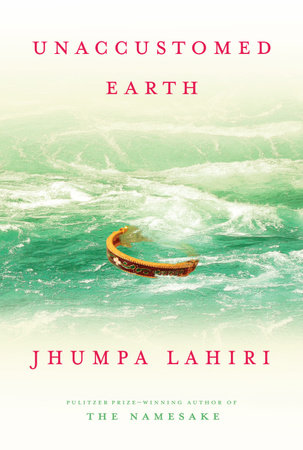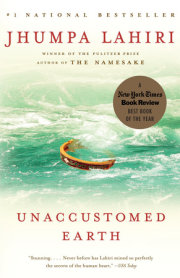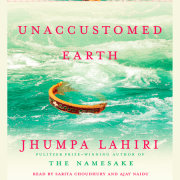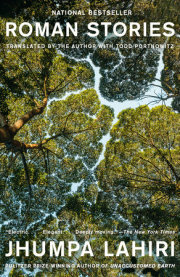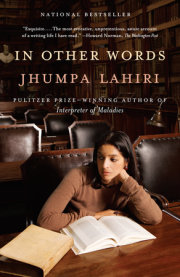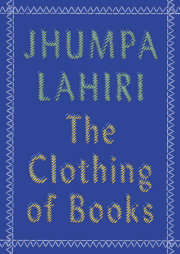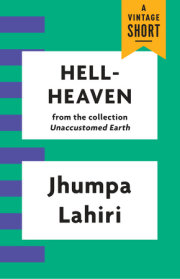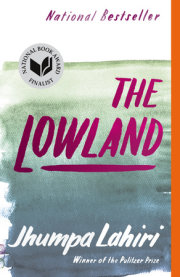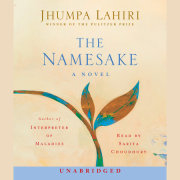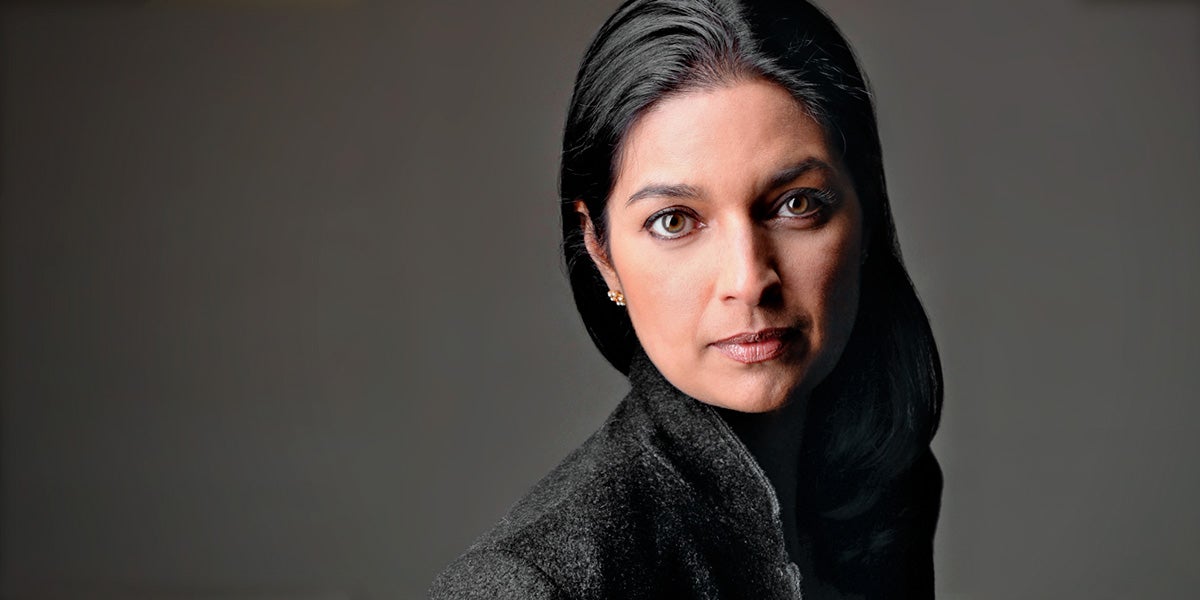A NEW YORK TIMES BOOK REVIEW BOOK OF THE YEAR
“Glorious.... Showcases a considerable talent in full bloom.” —San Francisco Chronicle
“Stunning.... Gorgeous.... Never before has Lahiri mined so perfectly the secrets of the human heart.” —USA Today
“A testament to Lahiri's emotional wisdom and consummate artistry as a writer.” —The New York Times
“Lucid and revelatory.... Both universal and deeply felt.” —The Washington Post Book World
“Graceful and devastating.... A gorgeous, meticulous and inviting work ... of an artist wise in enigmas and human mystery.” —The Miami Herald
“Powerful.... Profound.... Haunting.” —Los Angeles Times Book Review
“Shimmering.... Lahiri's fiction delves deep into the universal theme of isolation.” —Fresh Air
“Splendid.... Lahiri handles her characters without leaving any fingerprints.” —The New York Times Book Review
“Beautifully rendered.... Reading [Lahiri's] stories is hypnotizing-like falling into a dream.” —People (four stars)
“Lahiri steps back from the action, gets out of the way, so the people and things in her stories can exist the way real things do: richly, ambiguously, without explanation.” —Time
“Powerful.... Lahiri is a genius of the miniature stroke and the great arc.” —Elizabeth Taylor, Chicago Tribune
“Beautifully crafted.... The remarkable poignancy Lahiri achieves in her work ... is the result of tying [her] examination of exile to other, more universal moments of essential sadness in our lives: the death of a parent, the end of a love affair, the ravages of alcoholism on a family.” —The Boston Globe
“Shimmering.... The literary prize committees should once again take note.... To read Unaccustomed Earth and only take away an experience of cultural tourism would be akin to reading Dante only to retain how medieval Italians slurped their spaghetti. Lahiri’s fiction delves deep into the universal theme of isolation.... Lahiri is a lush writer bringing to life worlds through a pile-up of detail. But somehow all that richness electrifyingly evokes the void.... It’s customary when reviewing short story collections to adopt a ‘one from column A, two from column B’ kind of structure–you know, the title story always gets a ritual nod, followed by a run-down of which stories are the strongest, which have just been included for filler. But another stereotype-confounding aspect of Lahiri’s writing is that there aren’t any weak stories here: every one seems like the best, the most vivid, until you read the next one.... Lahiri ingeniously reworks the situation of characters subsisting at point zero, of being stripped down like Lear on the heath. Unaccustomed Earth certainly makes a contribution to the literature of immigration, but it also takes its rightful place with modernist tales from whatever culture in which characters find themselves doomed to try and fail to only connect.” —Maureen Corrigan, “Fresh Air”
“Peripatetic, sweeping stories–Lahiri’s best yet–which move from Boston to Bombay and back again to evoke intricate topologies of emotion and characters who often feel more at home abroad. [They] possess the gravitational pull of short novels.... The final three stories, a trilogy in which an educated, thoroughly American girl’s choice of an arranged marriage over romantic love (a decision Lahiri deftly makes relatable) has cataclysmic repercussions, form the rhapsodic culmination to the collection.” —Megan O’Grady, Vogue
“Five of five stars.... Commanding and seamless.... There might not be a better book of fiction by an American writer published this year.... Extraordinary ... The long, absorbing ‘Unaccustomed Earth,’ the title story [deals with] familiar themes [for Lahiri]: the alienation that Indian immigrant parents feel toward their American-reared children and the guilt those children feel as they assimilate into the melting pot of the U.S. But as she proved in Interpreter of Maladies and The Namesake, Lahiri writes so compellingly about these conflicts and pays such careful attention to the most emotionally telling of details that each story feels freshly minted.... The range of human experiences [Lahiri] chronicles is epic, again and again. [‘Hell-Heaven’ is] a universal story of yearning and unrequited desire, rooted so specifically and powerfully in a sense of time and place that we feel as if we are living right alongside the characters ... For all that’s comfortingly familiar about Unaccustomed Earth, though, one of its chief pleasures is that it shows Lahiri stretching in entirely new directions. In ‘A Choice of Accommodations,’ for instance, the author serves up a slice of Updike-ian Americana while managing to put her own distinct twist on the proceedings.... ‘Only Goodness,’ arguably the strongest story in the collection, gets under your skin like nothing Lahiri has written before. The first five stories are varied and accomplished [and the final three] are gripping and affecting ... Whereas so many story collections feel like uneven grab-bags, Unaccustomed Earth seems to have poured forth from the author’s pen in one swoop, and it eloquently circles back over the same sets of themes and motifs without growing tired. It’s like a symphony in eight movements.” —Christopher Kelly, Fort Worth Star-Telegram
“Four stars. Jhumpa Lahiri continues to probe culture and generational clashes among Bengali brethren living in the U.S. (and occasionally abroad) in her penetrating second collection.... No character exists in isolation in Lahiri’s new work, which is deeply aware of the power of blood ties; her book is a congregation of siblings, parents, spouses. Neither an exultation of nuclear families nor a cynical catalog of their dysfunction, Unaccustomed Earth is something braver and more difficult: a compassionate inspection of the fissures and disappointments of deep attachment ... trenchant. Whether they are middle-aged mothers who tire of years of keeping house in small Northeastern towns, thousands of miles away from Calcutta, or sisters who finally relinquish responsibility for alcoholic younger brothers, these characters are somehow redeemed by their courage to face the day, ‘as typical and terrifying as any other." —Melissa Anderson, Time Out New York
“[Lahiri’s] stories are quiet, deliberate, setting one foot down in front of the other, then exploding with a secret, an encounter, a clash. Quietly, then, they lay back down, leaving the reader astir in their unnerving calm. Lahiri’s [work], however, is rife with characters that are larger than the Bengali immigration experience, experiences larger than mere discontent. She’s an artist of the family portrait. The eight stories in Unaccustomed Earth have an emotional wisdom weightier than in Lahiri’s first collection, Interpreter of Maladies, which won the Pulitzer Prize, and they contain a more nuanced tightness than her neo-Chekhovian first novel, The Namesake.... Her new stories are better, stronger–evidence of a writer pushing herself to a deeper level.... Old-fashioned in her approach, contemporary in her subject matter, Lahiri anchors these stories in character.... In [‘Unaccustomed Earth’ and ‘Only Goodness’], new life brings hope to broken families, and mothers awash in tears must carry on when the baby cries. [Lahiri] captures these moments with clarity and grace, a tangible knowledge of how souls twist in the wind.... The ‘Hema and Kaushik’ stories, a trilogy that closes the book, prove the most haunting. The characters, Lahiri has said in interviews, lived with her for a decade, and their presence feels imprinted in these pages as if by letterpress.... In these three stories, Lahiri experiments with point of view. Forsaking her usual third-person narrator, she goes for the intimate whispers of first person. If one felt like a fortunate fly on the wall in previous stories, now the effect is to sit in between the beats of her characters’ heartaches.” —Leonora Todaro, The Village Voice
“Lahiri writes largely about the American-born children of middle-class Indian immigrants, but in doing so, she also nails the mores of affluent, educated Americans, both Indian and non-Indian. [‘Only Goodness’] presents a very believable picture of a relationship’s slow decline in a very recognizable urban setting. And that’s precisely what Lahiri does well.... Lahiri is a literary heir of Anthony Trollope in her ability to capture the way we live now. And that’s a testament to the way society has changed ... but also to Lahiri’s skill at evoking this world empathetically and unironically.” —Adelle Waldman, The New Republic
“Eight stories [that] are longer than those in [Lahiri’s] previous collection but just as absorbing and beautifully written.... Wonderful prose and masterful delineation of character. [Unaccustomed Earth] fulfills every expectation of her mastery of the prose medium.... Unaccustomed Earth is [Lahiri’s] customary style at its very best.” —Nancy Schapiro, St. Louis Post-Dispatch
“Beautifully crafted ... Lahiri navigates the interlocking themes of identity and assimilation, familial duty and grief ... employ[ing] quiet language to reveal debilitating truths.... Unaccustomed Earth showcases some of Lahiri’s best work and reinforces her claim to our literary high ground." —Tamara Titus, The Charlotte Observer
“‘Eagerly awaited’ is a phrase too often used to hype a new work. But in the case of Lahiri, it’s accurate. Lahiri again delicately writes of the Bengali immigrant experience, perfectly communicating the tension between the ideals of transplanted parents and the ones of their American children, in the short story format that made her so popular in the first place.” —Billy Heller, The New York Post
“Poignant ... precisely rendered, elegiac.... Lahiri details with quiet precision the divide between American-born children and their Bengali parents.” —Yvonne Zipp, The Christian Science Monitor
“Four stars. Beautifully rendered.... Unaccustomed Earth explores the dilemmas faced by Bengali immigrants in the west, yet its appeal is universal. Lahiri takes the reader from Massachusetts to Italy to London to Thailand as her characters discover love, freedom and the heartbreak of leaving one family to create another. In the standout title story, a lawyer on maternity leave struggles with her mother’s death and her own ambivalence toward motherhood. ‘Only Goodness,’ about the complexity of loving an addict, contains a darkness that proves the author capable of leaving her usual realm, quiet domestic tragedy, for rougher waters. Reading her stories is hypnotizing–like falling into a dream where colors are brighter, smells sharper and time moves more slowly than in real life.” —Danielle Trussoni, People
“Lovely ... elegant, unsettling.... Unaccustomed Earth is full of lost old-world parents and the modern marriages that can’t quite replace them.... The saga of Hema and Kaushik is ... a masterfully written and powerful drama. Though Lahiri’s characters construct sophisticated new identities for themselves, they are still irresistibly drawn to the reassuring traditions they’ve abandoned. The past exerts a wicked pull, even (maybe especially) when you’re all grown up and least expecting it.” —Jennifer Reese, Entertainment Weekly
“[Jhumpa Lahiri is] a succinct realist writer in an era of attention-getting maneuvers. Stylistically, [there’s] no genre bending, no comics-inflected supernaturalism, no world-historical ventriloquism, no 9/11 flip books. Just couples and families joining, coming apart, dealing with immigration, death, and estrangement. This is true of her debut short-story collection, Interpreter of Maladies (which won a Pulitzer in 2000); her novel, The Namesake (a best seller turned Mira Nair film); and her new book, Unaccustomed Earth–eight mature stories each stretching almost to novella length.... What makes Lahiri’s corner of the world seem so important, to her and to us? Maybe, for all the polish, it’s the lack of ironic layering that tends to distance us from the tragedies chronicled in most ‘literary’ fiction. Lahiri isn’t afraid to make people cry.... Lahiri writes often of illnesses, failing marriages, and just plain loneliness, but thanks to her economy and mastery of detail, it never quite crosses over into the sentimental. Nor does it rely on the melodramatic twists that are staples of more middlebrow writers. ” —Boris Kachka, New York Magazine
“Emotionally intricate and exquisitely crafted, Unaccustomed Earth’s descriptions of love and conflict are rendered through the lives of people whose traditions include arranged marriages and cultural cohesion. Much of the older generation seeks to honor tradition, and the younger seeks to explore personal choices.... One of Lahiri’s great strengths is to concentrate myriad conflicts into individual scenes where cultural, romantic and family betrayal coalesce. Like Jane Austen, Lahiri is brilliant at describing ambivalent emotions.... Stories of star-crossed lovers are not new, but when handled by Lahiri in the book’s second section, ‘Hema and Kaushik’ becomes a nearly perfect example of the linked story form. The stories are so richly detailed in their accounting of time, and so socially layered, that the meeting feels convincingly like destiny.... Masterful.” —John Holman, Paste
“Ferociously good ... acutely observed.... In exquisitely attuned prose, Lahiri notes the clash between generations.... She is emotionally precise about her characters and the way the world appears to them, especially in the superb ‘Hema and Kaushik’ [trilogy], which achingly reveals how two very unlikely families end up under one suburban roof, and how destiny entwines them forever. These are unforgettable people, their stories unforgettably well told.” —Elaina Richardson, O, The Oprah Magazine
“A great book ... to move you. Whether American or Bengali by birth, Lahiri’s protagonists valiantly walk a tightrope between personal choice and family expectation. Faltering or triumphant, each tugs at the heart.” —Good Housekeeping
“[Lahiri] explores with her modulated prose a full range of relationships among her subjects. So thoroughly and judiciously does she use detail that she easily presents entire lives with each story. These are tales of careful observation and adjustment.... Most moving is the final trio of intertwined stories about loss and connection.” —The Atlantic
“Lahiri’s finely drawn prose makes [Unaccustomed Earth] feel less like reading and more like peering into the most raw, intimate moments of people’s lives.” —Marie Claire
“Lahiri has boasted an enviable literary career since nabbing the Pulitzer for Interpreter of Maladies. Her new story collection, Unaccustomed Earth, should have no problem upholding her reputation.... Lahiri delves into the souls of indelible characters struggling with displacement, guilt, and fear as they try to find a balance between the solace and suffocation of tradition and the terror and excitement of the future into which they’re being thrust.... [Unaccustomed Earth] further establishes her as an important American writer.” —Kera Bolonik, Bookforum
“Lahiri’s enormous gifts as a storyteller are on full display in this collection: the gorgeous, effortless prose; the characters haunted by regret, isolation, loss, and tragedies big and small; and most of all, a quiet, emerging sense of humanity.”
—Khaled Hosseini, author of A Thousand Splendid Suns and The Kite Runner

